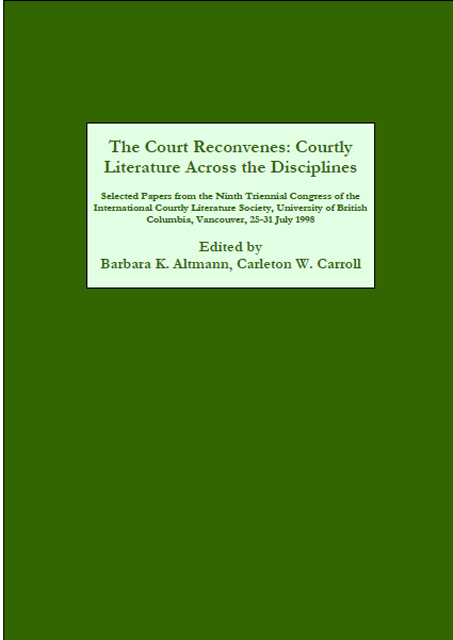 The Court Reconvenes
The Court Reconvenes Did John of Earley Write the Histoire de Guillaume le Maréchal?
Published online by Cambridge University Press: 31 March 2023
Summary
The biography of William Marshal, composed c. 1226, is still available only in the edition published by Paul Meyer at the turn of the last century as L’Histoire de Guillaume le Maréchal. It is a work described by Dominica Legge as one of the great glories of Anglo-Norman biography and few will disagree with her conclusion: “From every point of view this is one of the outstanding productions in Old French. It is well known to historians, less well known to students of literature, and this is a pity” (306–08). Historians have indeed acknowledged the importance of the Histoire as the primary source of information about a man who rose from relatively obscure birth in the 1140s to become Regent of England from 1216 until his death in 1219. Besides its interest for the political history of both England and France, the text also offers a rich quarry of information on numerous aspects of social history, from family relationships to tournaments. As regards literary history, it is significant as being the earliest known example of a genre – the biography of an individual who was neither a king nor a saint. It is moreover an excellent read. The warmly partisan tone of the biographer carries the reader along over nearly twenty thousand lines of verse, culminating in the magnificent and uplifting deathbed scene.
It is obviously of the highest interest to establish the identity of the author, but the hypothesis put forward by Paul Meyer, though it has been universally accepted, is quite unconvincing on close examination. Meyer attributed the authorship of the text to a phantom figure who appears in the epilogue. The relevant text runs as follows:
Ci fine la vie del conte
Mar., qui a tant se monte
Qu’en toz lius ou ele iert oïe
19168 Deit estre amee & esjoïe.
Tuit cil qui en ce se porvirent
Qui ceste estorie feire firent
I de[i]vent estre amenteü,
19172 Si qu’il seit oï & seü
De cels qui [le] livre orrunt lire
Qui fu qui dona la matire
Quil fist fere & qui tot le cost
- Type
- Chapter
- Information
- The Court ReconvenesCourtly Literature across the Disciplines: Selected Papers from the Ninth Triennial Congress of the International Courtly Literature Society, University of British Columbia, Vancouver, 25-31 July 1998, pp. 255 - 264Publisher: Boydell & BrewerPrint publication year: 2002
- 1
- Cited by
